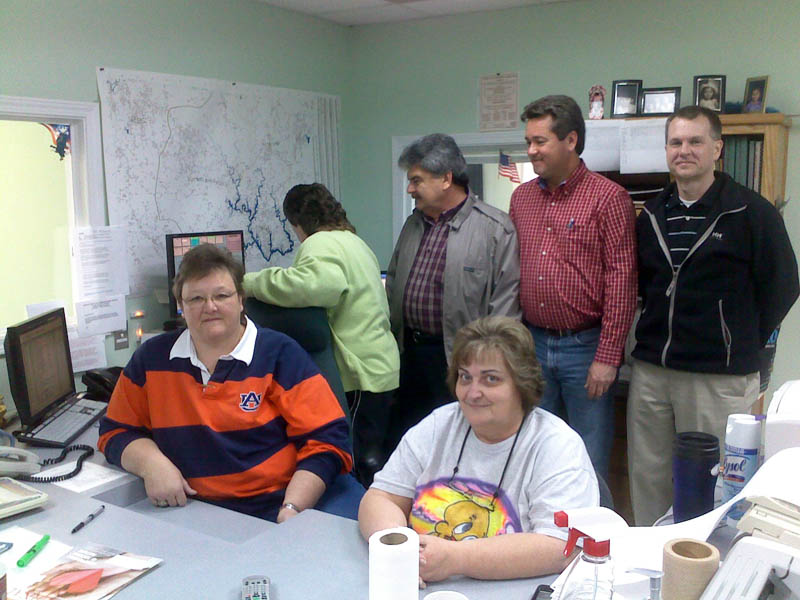Winston County E-9-1-1 Raises Surcharge
By Glenn Collins
Friday, March 11, 2011 | 9:47 AM
https://hbtv.us/news/?story_id=675
 |
| The E-9-1-1 Operations Center in Double Springs. Pictured (down front and moving clockwise) are Debbie Tidwell, Renita Crumpton, Deborah Hardy (back to camera answering a 9-1-1 call), ECD Chairman Kyle Reogas, ECD Director Tim Webb, and ECD Treasurer Don Posey. |
The Winston County E-9-1-1 Communications District raised its surcharge February 1, for the first time since its inception in 1996, amidst dwindling revenues, rising costs, and legislative attempts to reduce the revenue even more.
A residential phone line will now pay a surcharge of $2.68 per month. The original surcharge set in 1996 was $2.00. Business lines will now pay $4.50 per month.
Don Posey, Treasurer for the District, said, “It was a painful, but necessary, decision.”
In the period 2000-2010, revenue has increased 8.3%, while expenses have increased 75.1%. Since 2005, the ECD has operated in the red. The result has been a 10.55% loss in assets for the ECD.
The surcharge increase was discussed at the November meeting and the ECD took the action at its December meeting.
The surcharge is the only source of revenue for the ECD. ECD Director Tim Webb said, “Many ECDs receive subsidies from county commissions and/or municipalities.”
Haleyville Police Chief Kyle Reogas, ECD Chairman, said, “The cost of operating the (E-9-1-1) center has increased to the point that the (ECD) felt it was necessary to increase the rate to continue providing the E-9-1-1 service in the county.”
The ECD recently reduced staffing through attrition to lower expenses. ECD employees are now doing more work for the same pay, according to Webb.
Besides aging equipment and the overall increase in operating expenses such as utilities, a major problem facing ECDs is the loss of land-lines in the county.
Reogas said, “More and more people each day are having their house lines turned off and going to cell phones.” He added, “There's a big difference in the revenue we receive from a house phone than there is with a cell phone.”
This is a state-wide trend and ECDs are experiencing the same issue statewide. Reogas said, “With land-lines disappearing and people changing from wired to wireless, all the districts are experiencing a loss in revenue.”
Revenue from land-lines is down over $90,000 from its peak in 2003. That is a 30% drop. Wireless revenue also dropped in the same period, just over 7 percent.
In 2010, revenue from wireless connections was 35% of total revenue, yet wireless calls accounted for 78% of call volume.
Emergency communication districts only have control over the land-line surcharges. Wireless ECD charges are collected by the state and doled out to the ECDs based on population. Winston County currently receives about ½ of one percent of the monies distributed. The state gives the phone companies 20% of collected fees, the ECDs 80 percent.
Two bills currently before the legislature, one in the House and one in the Senate, would reduce the wireless surcharge from $0.70 to $0.65. That amounts to a 7% reduction in the wireless charge. The bill would also extend the E-9-1-1 surcharge to each purchase of a pre-paid wireless device and each purchase of minutes for these devices.
There are arguments that not all wireless connections are being assessed the E-9-1-1 surcharge.
The ECDs in Alabama, Reogas said, “... have a move on now to lobby the legislature to change some of the current regulations.” Reogas recently sent emails and letters to all six members of the legislature that cover Winston County asking not to reduce the wireless E-9-1-1 surcharge.
Two pre-paid providers, T-Mobile and Tracfone (Powertel Memphis Inc.), argue that current law does not apply to pre-paid wireless connections. They lost that argument in Circuit Court in Madison County in 2008. They have appealed to the Supreme Court of Alabama.
In 2002, then-Alabama Attorney General Bill Pryor said in an opinion, “The monthly $.70 emergency telephone service charge levied by the Commercial Mobile Radio Service is applicable to prepaid wireless service connections.”
CTIA – The Wireless Association®, argues to the Supreme Court in its amicus brief on behalf of T-Mobile and Tracfone, “The CMRS Board cannot extend the CMRS Service Charge statutes beyond the letter of the statutes to levy the Charge on prepaid wireless service and impose a collection obligation thereon. Only the Alabama Legislature can do this.”
The two legislative bills are in committee. House Bill 114 is sponsored by Rep. Greg Canfield, R-Vestavia Hills; and Rep. Oliver Robinson, D-Birmingham. Senate Bill 101 is sponsored by Sen. Del Marsh, R-Anniston; and Sen. Roger Bedford Jr., D-Russellville.
Whether or not the current Supreme Court case, or even the current legislation, will solve the financial woes of the state's ECDs is yet to be determined. One sure item: Winston County ECD cannot make another surcharge change until 2015 and expects to operate almost $100,000 in the negative in 2011.
Winston's $2.68 is not currently the highest flat residential surcharge. The highest is Clay County's $3.48. The cities of Bessemer, Birmingham and Tarrant and Randolph County charge 5% of the phone bill. Winston County is 7th in the state for flat surcharges. The median surcharge for ECDs that do charge is $1.75. Webb is aware of several ECDs considering surcharge increases, including Marion County.

